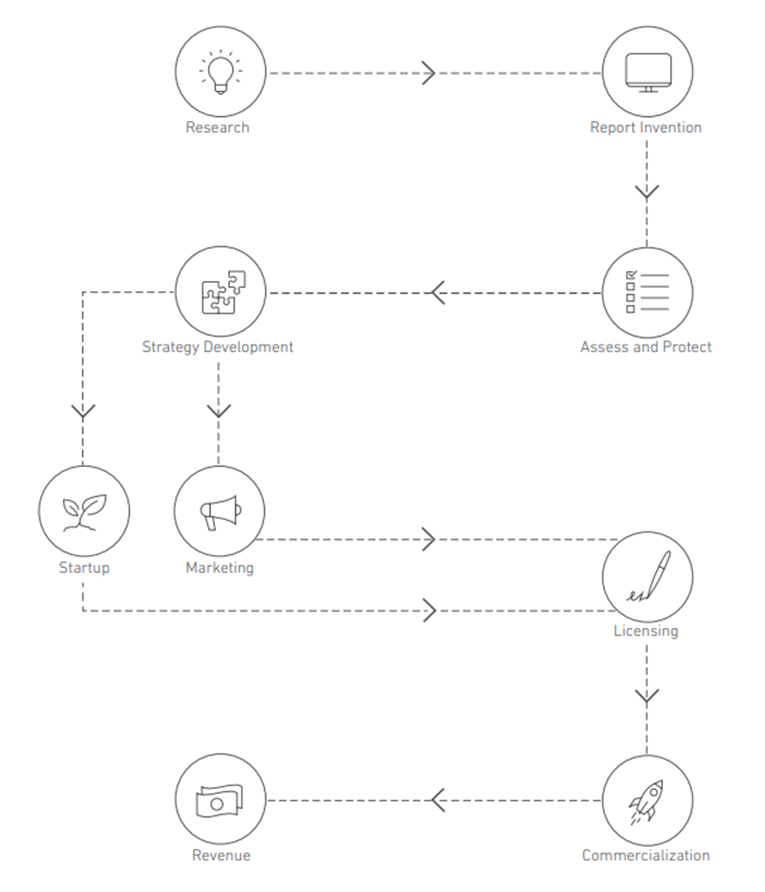The Business Partnerships Team are here to support, inspire and help you, your school or service and the University, make the most of your research, expertise, knowledge and ideas beyond the academic arena.
There are many ways in which your research, expertise, knowledge and ideas can impact on the economy, society and the community. Creating New Business Opportunities is one route.
Knowledge Transfer Partnership
Everything you need to know about Knowledge Transfer Partnerships.
Commercial Services
Interested in commercial work? Let us help...
Customer Relationship Management (CRM)
Microsoft Dynamics enables us to increase the effectiveness in how the University engages with external organisations.
Intellectual Property (IP)
IP protection can assist in both securing a market share and building a barrier to entry for competitors.
Impact Acceleration Account (IAA)
The aim of the IAA is to transform University of Huddersfield’s research into real-world opportunities.
3M Buckley Innovation Centre
The University's centre for enterprise & innovation, offering office/lab space, conference facilities and tech facilities for start-ups and SMEs.
The Team
Need more information? Connect with your Schools Business Development Manager (BDM), or our dedicated business partnerships team in RIKE.
What is Customer Relationship Management (CRM)?
CRM is all about managing and developing relationships with customers of the University in a more professional and consistent way. We believe that CRM is not just about a system but needs to be an approach to working with Businesses where we put the customer at the centre of the relationship.
A CRM system will support this by bringing information from around the University to one centralised point of truth, so that the University can understand how it works with the external world and work more efficiently.
Why do we need it?
The University understands the importance of growing the Research and Enterprise agenda and realises that Business and Community Engagement (BCE) is essential to its success. The CRM system will provide users with a full picture of relationships with external organisations and will provide a constant flow of reliable and quality information for staff.
Dynamics at the University of Huddersfield
In identifying the need for a CRM system, we have developed Microsoft Dynamics to enable us to increase the effectiveness in how the University engages with external organisations.
For more information on Dynamics and seeing how it can work for you please contact your school BDM or RIKE.
Accessing Dynamics
Please contact the CRM Team if you would like to access the system.
The CRM Team will provide you with a training session along with access to the test system and manual. Once your training has taken place you will receive your unique URL, where you can access Dynamics.
Training Sessions
Training sessions are available throughout the year for individuals and teams. Refresher sessions are also available as required, to arrange a session please contact the CRM team.
CRM Team contact details
Information for academic/researcher enterprise
A key mission for RIKE is to provide support and work with academics and staff from across the University to identify innovative opportunities that have potential to create social, environmental, community and economic impact through commercialisation and adding value to the innovation ecosystem.
Our objective is to drive intellectual property awareness, where appropriate put in protection registrations (such as patents, trademarks, design registrations) and to support the idea evaluation to determine market needs and best exploitation route. We manage the commercial transactions (joint venture creation, spinouts, licences, sales) from The University intellectual property that can result in revenues and value creation for both the University, School, the inventors and inventor contributors too.
But the benefits are more than financial. It provides case study for teaching, new partnerships which may lead to other research openings, helps the academic to become a trusted and recognised expert to stakeholders and peers. This also provides a real-world insight into the evolution of the journey from research to development, the steps necessary to do so, and attracts and encourages research funders, grant funders, government or sector funding agencies who look positively upon proposals that involve industry (public or private) interaction such as Innovate UK, Wellcome Trust, NIHR. Ultimately engagement and concept to commercialisation increases the reputation of The University.
So how does it work?
The academic initially has a conversation with their BDM and/or Impact Manager to determine suitability, then submits an ‘Invention Disclosure Form’ (IDF) to the Business Partnerships Manager (IP) in RIKE.
A pathway is discussed and agreed relating to the academics needs, interests, availability. For examples see IUK programmes https://www.icureprogramme.com/ , https://aspect.ac.uk/communities-of-practice/research-commercialisation/ and the Commercialisation Reactor https://www.youtube.com/watch?v=MdglvtXvgJU . These help determine market desirability (real customer needs), viability, feasibility for a workable business model to succeed .. or indeed fail fast which is a good innovation trait where indicated there is limited potential.
The Innovation Committee has the final decision on a go/no go for the project to commercialisation.
So, what else should I know?
IPEquip:
Well it’s always a good idea to gain some understanding around IPR, and perhaps complete the IP Office IPEquip module: https://www.ipo.gov.uk/ip-support
This e-learning tool helps you to understand intellectual property rights i.e. trade marks, patents, copyright and designs. It takes around 40 minutes (maybe also add it to your curriculums?)
IP Equip contains 4 short modules and uses case studies to show why intellectual property is important.
Benefits are free access to checklists, guides and a document library providing tutoring notes for academics in their research/course interests:
- CPD credit on completion (1 point)
- IPO certification via a certificate
- you can use your smart phone, tablet or PC to take the training.
Ownership:
The intellectual property of an employee, belongs in the first instance to their employer. There are of course exceptions, and the moral rights of authors and performers associated with intellectual property lie outside these economic rights. The University has an IP Policy, which outlines the University’s current approach to IP ownership and the sharing of any revenue generated from the exploitation of IP. The IP Policy.
Ownership in Collaborative and Consortium Research:
The situation becomes more complex when other academic and industrial parties are involved (either doing and/or funding) in the research collaboration or consortium. In an effort to shorten and simplify the negotiation processes associated with collaborative and consortium research agreements, model agreements have been developed. These “Lambert Agreements” are an excellent reference and starting point for these negotiations.
Background and foreground IPR:
You may see and hear IP described as either background or foreground. Background IPR is the IPR you are bringing to the project - both soft and hard which you and potentially your research partners will need to perform the research. Foreground IP refers to new IP created by the research.
Publication:
In general, as a fundamental minimum we must always ensure academic freedom to publish (subject to any reasonable delay to allow patenting etc.), and unfettered freedom to pursue academic research in the area.
For more information, contact Paul Field: p.field@hud.ac.uk
Click here to download a copy of the IDF Form

Business Partnerships Team
Rebecca Macdonald, Head of Business Partnerships

Andy Buncall, Business Partnerships Manager

Ann Swift, Business Partnerships Manager

Shona Malcolm,Business Development Officer

School Contacts
School of Computing and Engineering
Simon McKenna, Business Development Director
Marie-Claire Micuta, Business Development Manager
School of Human and Health Sciences
Carson McCombe, Business Development Manager
School of Arts and Humanities
Dr Rowan Bailey, Director of Enterprise and Knowledge Exchange
School of Business, Education and Law
Nikki Hill, Research and Knowledge Exchange Manager
KTP
The Knowledge Transfer Partnership (KTP) Office leads the development and management of KTP, at the University. This includes supporting our exciting portfolio of live projects, driving new opportunities, facilitating new applications, and managing stakeholder relationships to enhance KTP activity.
KTPs are a UK Research and Innovation (UKRI) scheme, managed by Innovate UK, connecting businesses with an innovative idea to an academic base, with the relevant knowledge, and facilitating collaboration to deliver an unmet need and achieve the innovation. Further information can be found on the KTP website.
The University of Huddersfield has a strong historic portfolio of KTPs engaging with the scheme since its conception having held over 100 KTP projects over the past 47 years, a list of the University’s live KTPs can be found here. With a vision to substantially increase our KTP portfolio, we have recently established a Community of Practice, to promote KTP by sharing information and good practice with anyone involved in, or interested in engaging with KTP, supporting, and enhancing knowledge and skills.
If you want to become a part of the KTP Community or if you have any questions regarding the scheme, please get in touch at ktp@hud.ac.uk.
AKT2I
Innovate UK has recently implemented a pilot programme called Accelerated Knowledge Transfer to Innovate (AKT2I). The scheme is aimed at developing short term projects which are likely to lead onto full KTP applications and build relationships between academic institutions and external parties.
The University was awarded 6 AKT2I grants, as part of the pilot, which will be supported by the KTP Office. Further information will follow once the pilot programme has concluded.
